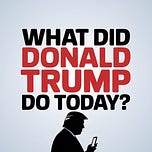Recent developments under the Trump administration reflect an alarming pattern of authoritarian rhetoric, constitutional overreach, and politically motivated policymaking. Two inflammatory posts from Donald Trump on Truth Social exaggerated the severity of protests in Los Angeles, mocked California officials, and signaled support for violent retaliation against demonstrators—rhetoric unbecoming of a national leader and dangerous to democratic norms. At the same time, his remarks at the 2025 “Invest America Roundtable” blurred the line between governance and campaigning. While the roundtable was meant to showcase the launch of “Trump Accounts”—a proposed savings program for newborns—the event devolved into partisan spectacle, marred by misinformation, ad hominem attacks, and unrelated grievances against political opponents. The program itself, pitched as cost-free, is in fact funded through controversial spending cuts and new taxes likely to impact vulnerable communities.
These issues are compounded by the administration’s militarized response to domestic protests. The deployment of 700 Marines to Los Angeles, in addition to 2,000 National Guard troops, raised legal and constitutional red flags, particularly since California’s leadership was not consulted. Trump’s framing of the protests as near-insurrection attempts, coupled with vague legal justifications under 10 U.S.C. § 12406, has been challenged in court by Governor Gavin Newsom and Attorney General Rob Bonta, who argue that Trump’s actions violate state sovereignty and federalism principles. As federal forces clashed with protesters, Trump’s public remarks continued to criminalize dissent and glorify executive power, further inflaming tensions.
Meanwhile, Secretary of Health and Human Services Robert F. Kennedy Jr. took the unprecedented step of removing all 17 members of the CDC’s vaccine advisory panel, the ACIP. Citing unsubstantiated claims of conflict of interest, Kennedy's move appears more ideologically driven than evidence-based, threatening to undermine public trust in vaccine policy. The purge aligns with Kennedy’s broader efforts to roll back vaccine programs and reflects his longstanding skepticism of mainstream medical consensus.
In the courts, a federal judge temporarily blocked Trump-era executive orders that sought to defund organizations promoting diversity, equity, and inclusion, as well as those recognizing transgender individuals. The ruling affirmed that federal grants cannot be conditioned on the suppression of constitutionally protected viewpoints, pushing back against what critics say is a broader trend of discriminatory policymaking by the administration.
Lastly, the appointment of Lindsey Burke, a Project 2025 contributor, as Deputy Chief of Staff at the Department of Education signals the administration’s growing alignment with the Heritage Foundation’s call to dismantle federal education infrastructure. Burke’s chapter of Project 2025 advocates for eliminating Title I funding, converting federal aid into block grants, and transferring civil rights responsibilities out of the department—all steps that are now being echoed by Secretary Linda McMahon and implemented under Trump. Together, these actions represent not just policy shifts but a systematic attempt to realign federal institutions around a hardline, ideological vision.












Share this post